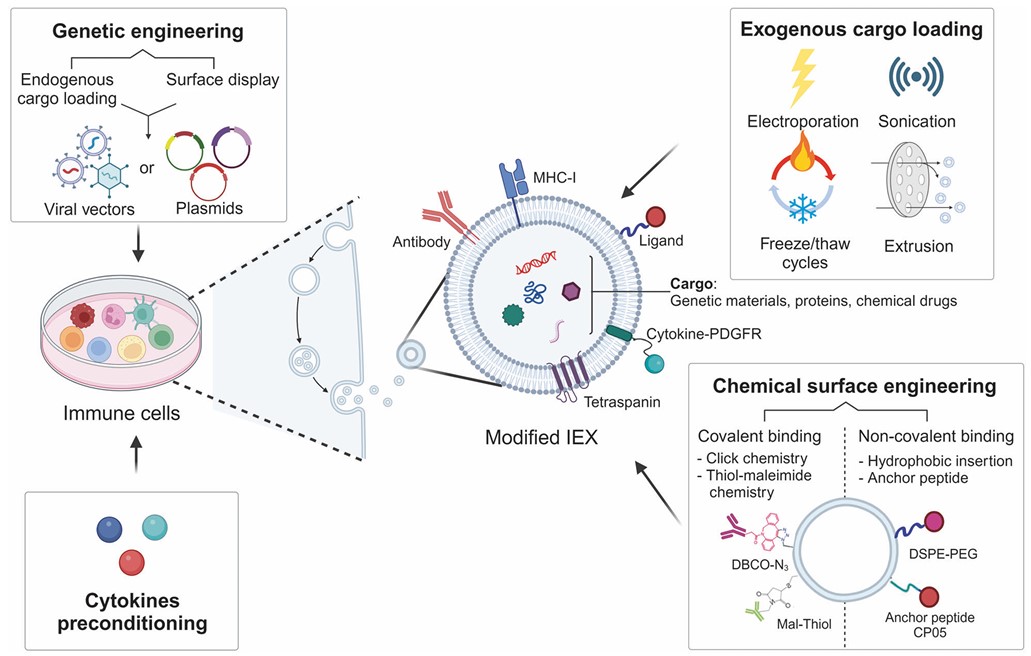Lung Cancer-Targeted Exosome Modification Service
Overview Services Features FAQs
Exploring engineered exosome-based drug delivery vehicles for targeted lung cancer therapies, which have extremely high incidence and mortality rates, is beneficial for improving the organ specificity of drug distribution after systemic administration. Creative Biolabs is dedicated to exploring the potential of exosomes in targeted cancer therapies and has built an innovative platform for custom modification and production of exosomes.
Overview of Exosomes in Lung Cancer
Exosomes with natural membrane structure are formed during endocytosis, fusion, and exocytosis biological processes in living cells and are obtained by isolation and extraction from a wide range of cells and body fluids. The abundance of lipid, protein and nucleic acid components facilitates exosome biostability and delivery of therapeutic cargo. Insights into the role of exosomes carrying these molecules within cancer and its pathological microenvironment provide critical information for expanding the use of exosomes in cancer research, diagnosis and therapy.
Immunologically inert exosomes mediating the delivery of deeply concentrated cargoes in lung cancer show great therapeutic potential. For example, exosome-loaded PTX was 50 times more potent than free PTX in inhibiting lung cancer. This not only suggests that exosomal carriers enhance drug penetration and EPR effects, but also involves effects on pharmacokinetics and pharmacodynamics. Meanwhile, the scale-up production of exosomes using GMP standards opens up greater prospects for their clinical studies and applications.
Exosome Modification Service Targeting Lung Cancer at Creative Biolabs
Creative Biolabs has established exosome modification platforms utilizing various molecular engineering, drug delivery, and targeting technologies to facilitate targeted drug delivery to lung cancer focal areas.
-
Exosomes encapsulated with high-density antibodies targeting specific ligands enable targeted delivery in lung cancer. Exosomes with surface modification of aminoethyl anisidine-polyethylene glycol (AA-PEG) can target lung cancer cells overexpressing sigma receptors, as well as exhibit a high loading capacity for drugs such as PTX and a profound ability to accumulate in the lesion after systemic administration. Among these, AA acts as a targeting ligand for delivering drugs, proteins and nucleic acids, while PEG-doped exosomes contribute to reducing drug immunogenicity. Our developed engineered exosomes targeting lung cancer have robust accumulation and virtually complete co-localization in lung cancer and lung metastases.
-
Considering appropriate cell sources allows for obtaining exosomes with natural lung cancer cell enrichment preferences. Breast cancer cell-derived exosomes have been shown to have a lung-homing effect, which is mediated by strong affinity binding between lung epithelial cells highly expressing SPC proteins and integrin ITGβ4 on the surface of breast cancer-derived exosomes. Furthermore, given the inhibitory effect of miRNA-126 on lung cancer cells, modified engineered exosomes targeting lung cancer combined with miRNA-126 for exosome cargo loading and functional testing services are also available.
 Fig. 1 Modification strategies of immune cell-derived exosomes for cancer immunotherapy.1
Fig. 1 Modification strategies of immune cell-derived exosomes for cancer immunotherapy.1
Features
-
Precision Engineering: We modify exosomes with high precision, ensuring consistent and reliable lung cancer-targeting results.
-
Customized Solutions: Our team of experts designs customized lung cancer-targeted exosome modifications tailored to client-specific research needs.
-
Comprehensive Support: From project design to data analysis, our dedicated team provides comprehensive support throughout the entire research process.
-
Cutting-Edge Technology: We utilize the latest advancements in exosome engineering to stay at the forefront of lung cancer research.
FAQs
Q: What is the advantage of using targeted exosome modification for lung cancer research?
A: Targeted exosome modification allows for the selective delivery of therapeutic cargo to lung cancer cells, minimizing off-target effects and improving treatment efficiency.
Q: How do I know if Lung Cancer-Targeted Exosome Modification is right for my research?
A: Our team of experts can help assess your research needs and recommend the most suitable exosome modification solutions for your specific project.
Q: Can I track the delivery of modified exosomes to lung cancer cells?
A: Yes, we offer tracking options to monitor the delivery of modified exosomes to lung cancer cells, providing valuable insights into treatment efficacy.
Creative Biolabs has accumulated experience in exosome-based research in a variety of cellular and mouse cancer models and can provide custom design and modification of exosomes with lung cancer-targeting research services. Please feel free to contact us.
Reference
-
Jung, Inseong, et al. "Modification of immune cell-derived exosomes for enhanced cancer immunotherapy: current advances and therapeutic applications." Experimental & Molecular Medicine (2024): 1-13. Under Open Access license CC BY 4.0. The image was modified by revising the title.
For Research Use Only. Cannot be used by patients.
Related Services:

 Fig. 1 Modification strategies of immune cell-derived exosomes for cancer immunotherapy.1
Fig. 1 Modification strategies of immune cell-derived exosomes for cancer immunotherapy.1









